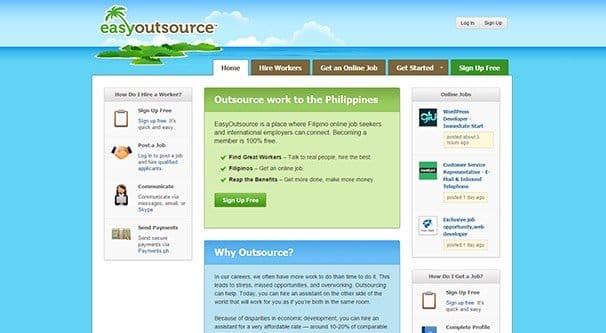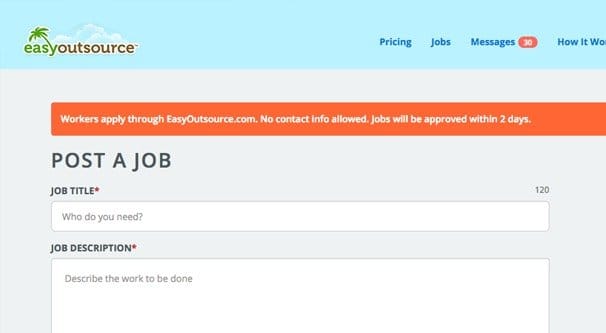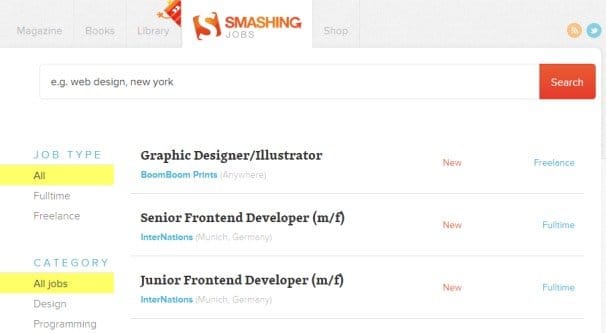 Written by ContentPowered.com
Written by ContentPowered.com
Running a Facebook page is a lot of work, but by the same token, it’s hard to outsource. There’s a lot you have to keep in mind, personal details about your marketing, your brand, and your plan. Sure, there are professionals who make a living managing Facebook pages, but they’re often extremely expensive, especially for an overworked entrepreneur with little or no help. You can’t ditch Facebook, but letting it languish is worse than killing it entirely. It’s too expensive to outsource to a firm founded for the purpose, so you’re left with limited options.
You can still outsource Facebook marketing, you just need to go about it a little differently. What you need is a virtual assistant.
What is a Virtual Assistant?
I’ve actually seen a little confusion on this point, primarily in the last few years, as phone companies have begun to co-opt the term for their own use. To be clear, I’m not talking about getting Cortana or Siri to manage Facebook for you.
A virtual assistant in this case is similar to a personal assistant, or in some cases an administrative assistant or even secretary. They are professionals who specialize in administrative, technical, or other forms of assistance for the people who hire them. In this case, you’d be hiring them for their social media management capability, rather than something like bookkeeping or data entry.
A virtual assistant is a personal assistant who works with you online. You never need to meet with them face to face, and even something as advanced as a Skype call is often unnecessary. As long as you can find a satisfactory means of communication for both people, it can be anything from Google Voice or GChat to AIM or simple email.
With the prominence of advanced marketing tools, it’s grown easier than ever to allow a virtual assistant to work with your social profiles without having to give them total control. Whenever you see a program like HootSuite that has space for team members, they’re allowing for the possibility of virtual assistants as well as in-house employees.
Virtual assistants have the benefit of being cheap compared to all of your other options. They’re faster and cheaper in terms of time than doing everything yourself, though obviously you pay for that freedom. They’re cheaper than hiring an employee in house, and they’re cheaper than a dedicated Facebook marketing firm.
The caveat, the flip side, is that they might not be specialists in the field you want. They might have Facebook Expertise listed on their credentials, but that doesn’t necessarily mean they know the ins and outs of Power Editor for Facebook ads, or how EdgeRank specifically works. It means they know how to use Facebook at a casual level and have some basic understanding of marketing.
You will generally need to spend some time training a virtual assistant and bringing them up to speed. If nothing else, even if they are experts in Facebook marketing, they still need to understand your brand and your goals, and need to be provided with resources so they can succeed working for you without having to bug you every ten minutes with a question.
Virtual assistants are freelancers and work on a contract basis. This means you won’t have to deal with taxes when paying them, but you will have to send out the appropriate tax forms each year. You will also not be able to make total demands on their time; how they work is up to them, as long as they get the work you want them to do done. They are also free to work with other clients, up to and including your competitors, and you neither get to know nor get a say in their choice. That is, of course, unless you can convince them to sign a contract with an exclusivity or non-compete clause, but good luck with that. Most freelancers will just laugh at you if you try that, unless your pay rate is good enough to warrant it, at which point you should just contract a marketing company instead.
Security Concerns
Since you’re working with a virtual worker who doesn’t work in an office under your control and doesn’t use hardware you own, you have very little say over how they perform their work. However, if you have specific tools for them to use, like an account with HootSuite, AgoraPulse, or Buffer, you may want them to continue using it. This gives them access to the resources you already have in your account, the projects, organization, and data you’ve compiled. Even just working with Facebook, you would need to add them to your page with an editor or advertiser role.
Security is, obviously enough, a concern. You don’t want to simply give them your user info and passwords; they would be free to change them on you or demolish your account without repercussion or limitation.
Lastpass, the password manager, has a way to deliver an encrypted book of passwords to another user so they can use dummy passwords, filtered through it, to access accounts. However, this only keeps your password secure, not your account. They still have access once they’re logged in.
The real solution, as mentioned above, is to add them as a limited team member on an account you control as administrator. HootSuite and many other marketing tools have this option, as does Facebook itself. Page roles are Facebook’s organizational structure if you don’t need any special tools, or want the virtual assistant to use their own.
Finding a Virtual Assistant
Now, the first thing you want to do is find a virtual assistant you can work with. There are a few considerations to keep in mind here.
- Foreign or domestic? Virtual assistants based out of Malaysia, India, or other countries with low living costs can be very cheap, but you may have to deal with timing issues and a language barrier, not to mention payments across borders and legality issues if they somehow scam you.
- Budget? This partially ties into the previous point, but your budget limitations will have serious consequences on who you can hire. The more you’re willing to train, the more you can consider a cheaper VA.
- Attitude. Remember, a virtual assistant is a contractor and employee first and foremost. You should be able to get along with them, but they aren’t your friend. They aren’t going to be chatting about movies all day or listening to your latest love life woes.
It’s not a decision you should make lightly, so make sure you’ve given these things plenty of thought before you go out looking to make first contact with a new VA.
Next, you have to actually find a virtual assistant, which means finding a place where you can find them. You have a lot of options here.
- Craigslist. Simply post an ad and see who applies. This has the drawback of being likely to flood you with vastly underqualified people.
- Upwork. The merger of oDesk and Elance made this one of the largest freelancer hubs on the internet, but it’s used for a lot more than just virtual assistants, so the selection may be smaller than it looks at first glance.
- OnlineJobs. This is a huge site full of virtual assistants, but you need to pay to access it, and it’s entirely made up of Filipino workers. If you’re looking exclusively domestic, this isn’t the place for you.
- EasyOutsource.com. Very similar to OnlineJobs, EasyOutsource is a job board for Filipino workers. We’ve hired a few virtual assistants from this site with great success.
- PeoplePerHour. Another Upwork-like with a large variety of workers sortable by their preferred hourly rate.
- Freelancer.com. One of the oldest and largest freelance networks for both workers and businesses.
- Guru.com. A site for the more technical virtual assistants, available on a per-hour or per-project basis.
- Zirtual. Another US-based virtual assistant hub, specializing in folks who are experienced with working with small businesses and small teams.
And, of course, dozens of other sites ranging from almost-as-big to very small. There are far too many sites to list and, having not used 99% of them, I can’t give you opinions on their quality. You’ll simply have to check them out and do some reputation research before you jump in or pay for access to a site.
Forming a Social Media Plan
Once you’ve chosen a virtual assistant, you should give them a test assignment to see how they perform. Rather than give you an example of a test, though, I’m going to skip past that and assume you’ve found a VA that works for you. You need to set up a social media plan with them, and it should involve a selection of what I cover below. Your test, then, can be a small element of any of these.
Content: Social media is heavily driven by content. Who will be producing the organic content for your page, you or your VA? How much direction will you give your VA, if they’re the ones producing it? Do they know what sort of content topics, length, and frequency is most important for posting on Facebook? Are they aware of the need for value in every post, and for engagement after the post is live? Do they know how to schedule, and how to use tools like Buffer to find the optimal times to schedule?

Analytics: Monitoring your audience and keeping an eye on growth rates is important for both organic and paid posting. Having someone who knows how Facebook Insights works, how to generate specific reports, and what metrics are worth monitoring is something that can’t be underestimated. It’s always valuable, and if your VA comes with some knowledge of how to read and interpret analytics, particularly Facebook analytics, it’s a huge benefit. Of course, you can always just throw them a beginner’s guide and hope they can learn on the fly.
Influencer Outreach: One of the most profitable and least expensive ways to market in the modern social era is through influencers. If you’re having a VA do this kind of work, they need to understand your industry and your business very well, so they can identify the kinds of influencers they could reach out to network with. They also need to understand who to avoid, such as your direct competitors. On top of that, they need the communication skills necessary to successfully contact and engage influencers themselves.
Audience Engagement: If you’re having your VA work directly with your customers and your Facebook audience, they need to have the customer service skills necessary to handle irate complaints, angry reviews, spam, and positive engagement, all while maintaining a personable brand face. They should also be able to filter customer service complaints to the right resources, such as guides for troubleshooting or a direct contact number for serious issues. Giving them the authority to do so will often require some direct training.
Paid Advertising: Paid advertising is where you go if you have a lot of trust in your VA. You don’t want just anyone in control of your budget, after all. This combines many of the above elements as well; they need to know to make the right kind of content to engage your audience, they need to know your audience well enough to understand the content necessary to reach them, and they need to understand analytics to pull it all together. This is not for the novice VA, and it’s likely the one element of Facebook you’ll handle yourself until you can train them.
Only once you’ve decided what you want them to do can you start training them and hooking them up with your resources to get your virtual assistant up and running. I’m not gonna lie; you’ll have a few months of onboarding ahead of you, and will probably still shoulder a good portion of the workload until you know they’ll work out. Once they prove themselves, however, you’re free to expand your business in another direction and take full advantage of the VA and their services.



